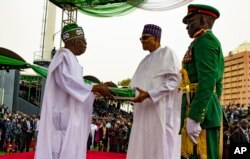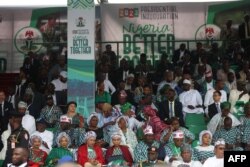Bola Tinubu became Nigeria's president Monday during a period of unprecedented challenges for Africa's most populous country, leaving some citizens hopeful for a better life and others skeptical that his government would perform better than the one he succeeded.
Thousands of Nigerians and several heads of government attended the swearing-in ceremony for the 71-year-old Tinubu in the country's capital, Abuja. He succeeds President Muhammadu Buhari to lead a country that by 2050 is forecast to become the third most populous nation in the world, tied with the United States after India and China.
Tinubu — the former governor of Lagos, which is Nigeria's economic hub — has promised to build on Buhari's efforts to deliver democratic dividends to citizens in a country where deadly security crises, widespread poverty and hunger have left many frustrated and angry. And with his election still being contested in court by opposition parties and among many young Nigerians, Tinubu has also pledged to reunite the country.
In Photos: Bola Tinubu Sworn In as Nigeria's President
In his first comments as president, Tinubu, also from Buhari's party, declared that "hope is back for Nigeria" and said he would work beyond improving the economic and security conditions to unite a deeply divided nation and ensure fairness and justice for aggrieved groups.
"We have endured hardship that would have other societies crumble," said Tinubu. "Our mission is to improve our ways of life in a manner that nurtures our humanity, encourages compassion towards one another and duly rewards our collective efforts."
Symbolic of a transition of power and loyalty to the new president, Gen. Lucky Irabor, Nigeria's chief of defense staff, presented old national and defense flags of Nigeria to Buhari and received new ones from Tinubu, who is also the Chief of the Armed Forces.

Following the national elections in February, newly elected governors also took their oath of office in many Nigerian states Monday.
At the inauguration venue, neither of the two main opposition candidates challenging Tinubu's election in court was present and many Nigerians tweeted in protest to Tinubu's inauguration. The outcome of the court challenge is due in about three weeks. If the opposition challenges are upheld, it would be the first time a presidential election would be nullified by the court in Nigeria's history.
Tinubu's manifesto of "renewed hope" prioritizes the creation of sufficient jobs and ramping up of local production of goods, investing in agriculture and public infrastructure, providing economic opportunities for the poorest and most vulnerable as well as creating better national security architecture to tackle all forms of insecurity.
However, Tinubu's ambitious plans could be threatened in his first 100 days in office by a mountain of challenges, from insecurity to a fiscal crisis, poverty and deepening public discontent with the state, said Mucahid Durmaz, senior West Africa analyst at risk intelligence company Verisk Maplecroft.
In Nigeria's capital, Abuja, locals identified economic hardship and insecurity as the biggest challenges they struggled with during Buhari's eight-year rule. "People have really suffered [during] this period. People have been dying because of a lack of money, and I pray and hope we should not experience this kind of thing again under the new president," said Princess Taiwo, a fruit seller.
Long before Buhari came to power in 2015, Nigeria's development has for many years slowed under the weight of poor governance and endemic corruption, making it difficult for citizens to benefit from the country's high earnings as Africa's top oil producer.

Though he has whittled down the power of Islamic extremists in the northeast and has built key infrastructure with the aid of foreign loans, many believe the quality of life and standard of living has reduced under Buhari. They cite widening insecurity in other parts of the country, growing poverty as well as an economy struggling with record unemployment, inflation at an 18-year high of 22.2%, and rising debt.
"When you combine the lack of opportunities in an environment that is disabling with a strong youth population that is frustrated, that is a ticking time bomb and that is the story of Nigeria over the past 50 years and Buhari has made it worse," said development expert Kolade.
Coming from the ruling All Progressives Congress, which has been dogged with allegations of corruption, Tinubu's emergence as Nigeria's president-elect has also drawn concerns about how transparent he would be in office.
Although he has often talked about assembling the best hands to lead Nigeria, the nation's problem has never been about the quality of public officials but about accountability, said Leena Koni Hoffmann-Atar, associate fellow in the Africa program at the Chatham House think tank.
"What we underestimate is that for state institutions to be strengthened, beyond the character and competence of the individuals, you have to have processes of accountability. And it remains to be seen whether accountability in state institutions will be strengthened under his administration," said Hoffmann-Atar.
Tinubu must also act quickly and decisively to tackle Nigeria's security crises with the country already in a critical situation, analysts said.
"There is already a very substantial loss of confidence in the government as a protector of citizens," said Nnamdi Obasi, senior adviser for Nigeria at the International Crisis Group. "If the new government fails to act very decisively, we would have more people seeking their own self-help and protection."
Among those now contemplating self-protection are villagers in north central Plateau state's Mangu district where gunmen killed more than 100 people in a late-night attack earlier in May. Yaputat Pokyes, one of the survivors, said all that they want from the incoming president is to help them stay alive.


